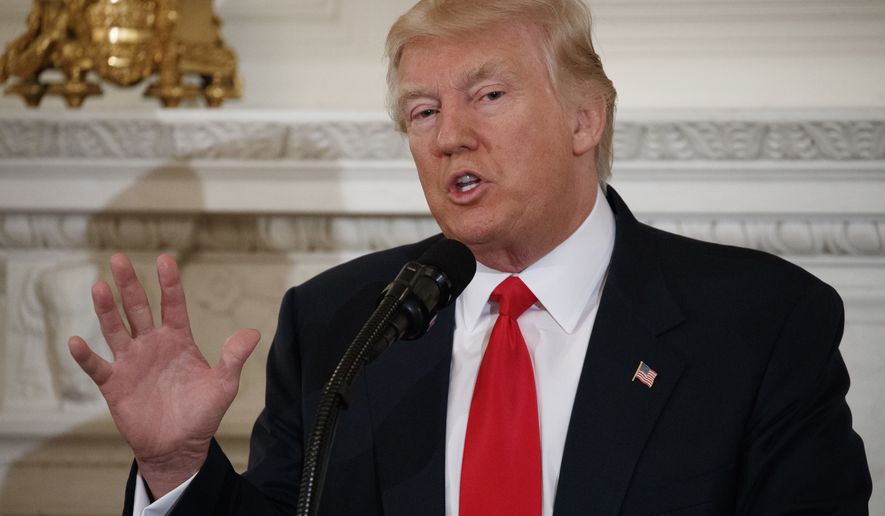President Trump told insurers and governors Monday that Obamacare is a disaster but that fixing it is “unbelievably complex,” as he took his latest ginger steps into the middle of the messiest fight in Washington.
The president is already behind on his own self-imposed deadlines and Republicans are looking to him to provide more leadership as they struggle to come up with a repeal plan that can unify Republicans, much less attract bipartisan support that will be needed to fully replace the Affordable Care Act.
Mr. Trump waded into the debate in Monday’s sit-down with major insurers, saying the GOP will offer a “very competitive” health proposal soon, with more hints of his plans coming Tuesday when he delivers his first major address to Congress.
Members of the House Freedom Caucus are hoping Mr. Trump will nudge GOP leaders to speed up the pace of repeal, saying that’s what they promised voters.
But Mr. Trump’s also heard from Ohio Gov. John Kasich and other Republicans who say parts of Obamacare have been a boon for their states, complicating his political calculus.
“It’s an unbelievably complex subject. Nobody knew that health care could be so complicated,” Mr. Trump told governors visiting the White House.
The signs were there all along, however.
The GOP blew by its first deadline for crafting its repeal plans in January, despite Mr. Trump’s plans to repeal Obamacare at the outset of his presidency.
Mr. Trump then said he’d roll out a plan once his health secretary, Tom Price, was confirmed. Mr. Price’s swearing-in came and went two weeks ago, leaving congressional Republicans to defend a rough outline of their own plans in front of hostile crowds back home.
Lanhee Chen, a fellow at Stanford University’s Hoover Institute who advised 2012 GOP nominee Mitt Romney on health policy, said the president is entitled to a settling-in period, though “going forward, we would all benefit if he took a more assertive role.”
“He’s in a unique position to define the terms of the debate going forward. He’s the only one with a national constituency,” he said.
For now, House Republicans are trying to pin down the details of a plan that uses fast-track budget rules to repeal and replace as much of Obamacare as they can, while avoiding a Democratic filibuster in the Senate.
The plan would replace Obamacare’s exchanges and income-based subsidies with tax credits based on age, while unwinding generous federal funding for states that expanded their Medicaid populations under President Obama.
Ways and Means Chairman Kevin Brady, Texas Republican, said Republicans are working with the Congressional Budget Office to fine-tune their proposal and understand the economic impacts of their plans.
“This is a continuous loop. We’re updating our drafts on almost a daily basis,” he told reporters Monday. “It is a little like turning a Rubik’s Cube.”
Yet the leader of a major bloc of conservative balked at an early draft of the plan late Monday, deepening questions about the effort.
“There are serious problems with what appears to be our current path to repeal and replace Obamacare,” said Rep. Mark Walker, North Carolina Republican and chairman of the Republican Study Committee, which boasts about 170 members.
“The draft legislation, which was leaked last week, risks continuing major Obamacare entitlement expansions and delays any reforms,” he said. “It kicks the can down the road in the hope that a future Congress will have the political will and fiscal discipline to reduce spending that this Congress apparently lacks.”
Democrats are relishing the disarray, saying the GOP’s repeal bid will be overwhelmed by intra-party disputes and backlash to their plans back home.
“I predict the discord in their party will grow as Republicans return to Washington and after this last week of angry town halls,” said Senate Minority Leader Charles E. Schumer, New York Democrat.”I believe the odds are very high that we will keep the [law]. It will not be repealed.”
Mr. Trump says he argued in favor of sitting idle, if only because Democrats would have to explain why premiums are rising and choices dwindling under their signature reforms.
“Once we start doing it, we sort of inherit the problem, we take over the problem. It becomes ours,” he told a dozen health insurance lobbyists and CEOs, including the chiefs of companies who’ve retreated from President Obama’s program. “But it’s the right thing to do for the American people. I think allowing this to go on, this disaster to go on, is a mistake.”
Analysts said Mr. Trump may have no choice but to adopt a larger role in the debate.
“If he doesn’t help congressional Republicans work through these issues, there is a risk the whole repeal effort will fail, which will be devastating for the GOP base,” said Darrell West, director of governance studies at the Brookings Institution. “The president has been surprisingly ’hands-off’ on this issue and he has to be careful not to get blamed if things go off the rails.”
⦁ David Sherfinski contributed to this story.
• Tom Howell Jr. can be reached at thowell@washingtontimes.com.




Please read our comment policy before commenting.